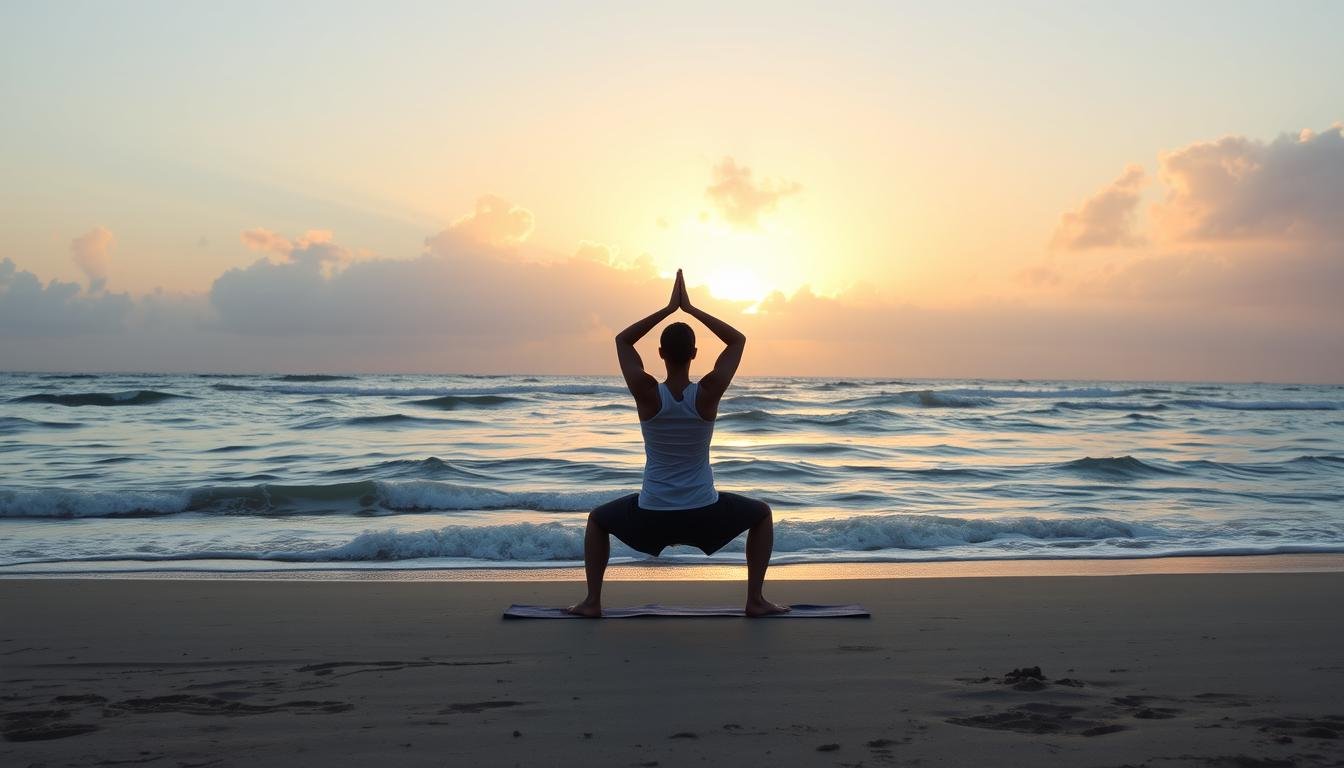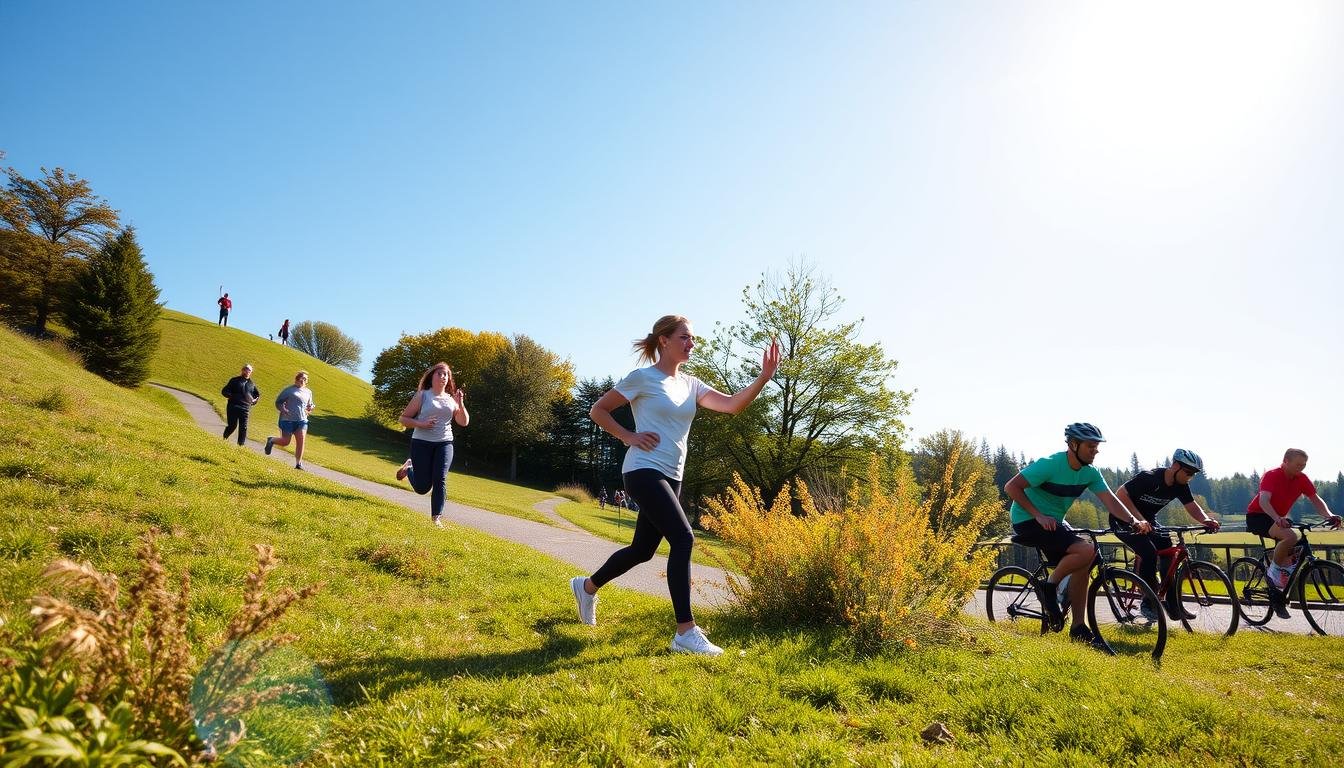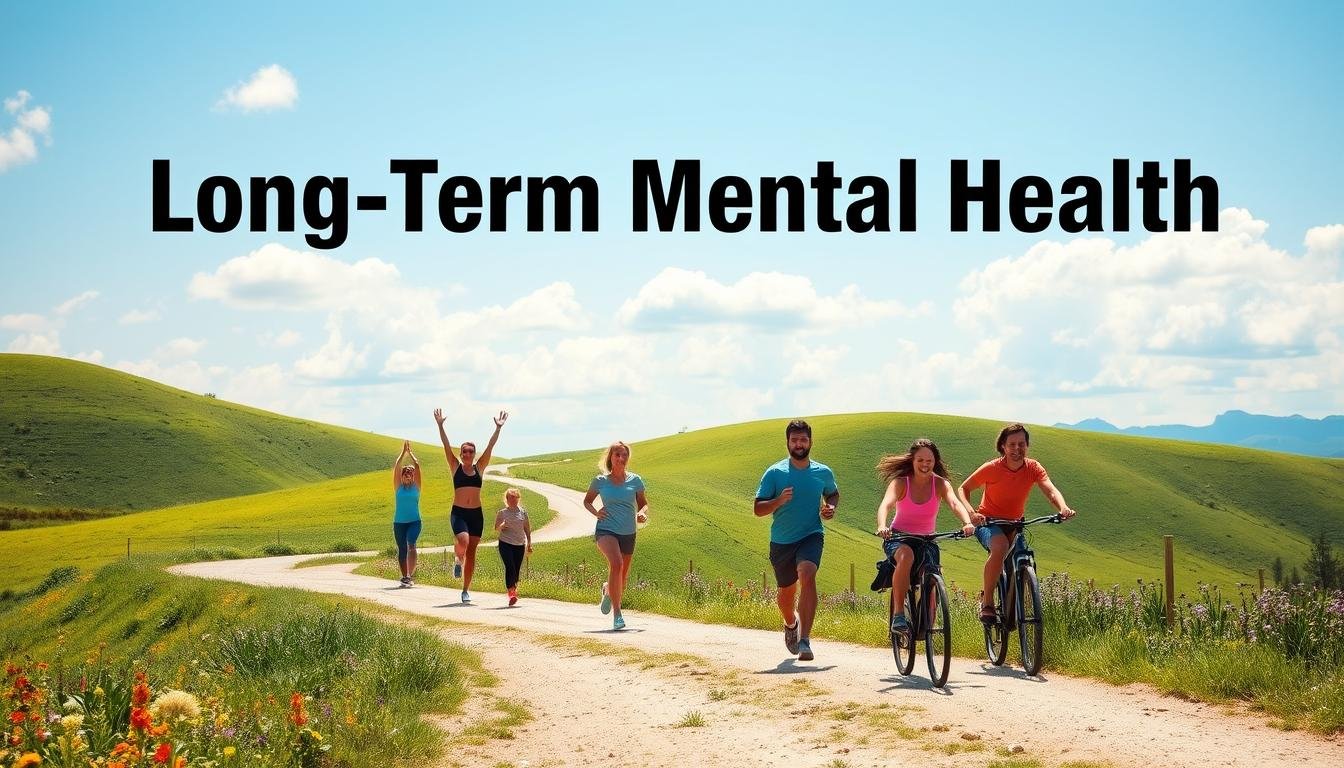Ever noticed how a brisk walk can brighten your mood on gloomy days? It’s not just your mind playing tricks. There’s real science behind it. Regular exercise does more than just build muscle or help you lose weight. It’s a powerful way to boost your mental health.
The World Health Organization says exercise can really help with depression and anxiety. It’s like a natural medicine, working alongside traditional treatments. Making this simple change could unlock big mental health benefits for you.
Introduction to the Connection Between Exercise and Mental Health
It’s important to understand how exercise affects our mental health in today’s world. Mental health issues are common, and finding ways to improve it is key. The Centers for Disease Control and Prevention (CDC) says nearly 20% of American adults face mental illness yearly. Adding regular exercise to your routine can help a lot.
Exercise does more than keep you fit; it also boosts your mood. Activities like jogging, yoga, or brisk walking can make you feel better. This article will explore how exercise helps with mood, anxiety, and more. It aims to help you see how exercise can improve your mental and physical health.
This guide will show you how exercise can help with anxiety, depression, and even sleep. Imagine starting your day with a run or joining a yoga class. By the end, you’ll know how exercise can change your mental health for the better.
We’ve gathered data to highlight exercise’s role in mental health. The next sections will share examples and details on exercise’s benefits. Are you ready to improve your mental health through exercise? Let’s start!
How Exercise Affects Your Mood
Exercise is known to boost your mood. It makes your body release chemicals that make you feel better. Let’s explore why exercise makes you feel so good.
The Science Behind Exercise and Happiness
Research in the Journal of Happiness Studies links exercise to happiness. Activities like running or cycling increase endorphins and other happy hormones. These hormones are key to feeling happier and less stressed.
The American Psychological Association (APA) says regular exercise greatly improves your mood. It makes you feel more euphoric.
Releasing Endorphins: The Natural High
Exercise releases endorphins, your body’s natural painkillers. When you do intense activities, your body sends out these endorphins. They interact with your brain to lessen pain.
This process is called the “runner’s high.” It’s why people feel happy and less stressed after working out. The feeling after a good workout is amazing. It also helps keep your mind balanced.
The Impact of Exercise on Anxiety
Understanding how exercise reducing anxiety works starts with its many benefits. Regular physical activities can help a lot with stress relief and fighting anxiety. The Anxiety and Depression Association of America says exercise boosts mood by releasing endorphins.
Adding physical activity to your daily life can lead to fewer anxiety attacks. Exercise helps control your nervous system, lowering tension. The great thing about exercise is its variety. Whether it’s a simple walk or a tough workout, each one has its own benefits for stress relief and mental health.
| Type of Exercise | Benefits |
|---|---|
| Running | Boosts endorphins and reduces stress hormones |
| Yoga | Combines physical movement with breath control, promoting relaxation |
| Strength Training | Improves mood and increases confidence |
| Walking | Offers a simple way to clear your mind and reduce tension |
By adding these exercises to your life, you’ll have a strong way to handle anxiety. So, if you want to find real stress relief, starting a regular exercise routine could be your path to mental calm.
Exercise as a Tool to Combat Depression
Exercise is now widely recognized as a way to fight depression. Studies and personal stories show its benefits. Adding therapeutic exercise to your day can greatly improve your mood. Many studies from trusted sources support these findings.
Case Studies and Research Findings
Harvard Medical School has done a lot of research on exercise and depression. They found that regular activity can really help. People who exercise daily are less likely to get depressed than those who don’t.
“Exercise is a natural and effective anti-depressant,” notes Dr. Michael Craig Miller from Harvard Health Publishing. “Even moderate physical activity can greatly improve your mental health.”
Personal Stories of Improvement
Many people have found exercise helps with depression. They share how regular workouts have changed their lives. Some like running, while others prefer yoga or weightlifting.
Lisa, a 30-year-old from California, said, “Daily runs changed my mental health. It helped me use my energy positively and cut down on depression.”
These stories and research show exercise’s big impact on fighting depression. It’s a key part of taking care of your mental health.
How Regular Exercise Enhances Cognitive Functions
Regular exercise is good for more than just your body. It also boosts your brain power. Whether you want to remember things better or make smarter choices, moving your body helps.
Memory Improvement
Research shows that exercise can greatly improve your memory. It helps grow new brain connections, especially in the hippocampus. This area is key for learning and remembering.
Seniors who stay active keep their brains sharp. They experience less memory loss than those who don’t exercise regularly.
Better Decision-Making Skills
Working out also sharpens your brain for making better choices. It boosts blood flow to the brain. This makes it better at handling information and reacting quickly.
With a more active brain, you can evaluate situations better. This leads to smarter decisions. Regular exercise connects physical activity with mental sharpness.
Types of Exercise Beneficial for Mental Health
Adding different exercises to your routine can greatly improve your mental health. Let’s explore some of the top exercises for mental well-being:
Aerobic Exercise: Running, cycling, and swimming are great for your mind. Studies in the American Journal of Preventive Medicine show they can lessen depression and anxiety. These activities boost endorphins, giving you a natural high and better mood.
Mindfulness Activities: Yoga and tai chi are excellent for mental health. They help you relax and lower stress. These practices focus on breathing and movement, helping you stay calm and balanced.
Strength Training: Strength exercises like weight lifting are also beneficial. They build confidence, improve sleep, and balance hormones, affecting your mood.
Mixing these exercises can help improve your mental health in a complete way. Here’s a table for a quick look:
| Exercise Type | Benefits for Mental Health |
|---|---|
| Aerobic Exercise | Boosts endorphins, reduces depression and anxiety |
| Mindfulness Activities | Promotes relaxation, reduces stress, enhances emotional balance |
| Strength Training | Builds confidence, improves sleep, regulates mood |
Choosing the right exercises for mental health is key to a balanced approach. By combining aerobic exercise, mindfulness, and strength training, you can achieve a healthier mind and body.
Long-Term Mental Health Benefits of Physical Activity
Regular physical activity does more than keep you fit. It greatly improves your mental health. By adding exercise to your daily routine, you can boost your mental well-being and develop a positive outlook.
Resilience Against Stress
Regular exercise is key to building stress resilience. The American Heart Association says it helps your body deal with stress better. This makes life better, letting you face challenges with more confidence and ease.
Maintaining a Healthy Mindset
Physical activity helps keep your mind positive. The Mayo Clinic found that staying active leads to a more positive view of life. Exercise releases chemicals in your brain that make you feel happier and more relaxed, improving your mental health over time.
The Role of Exercise in Improving Sleep Patterns
Regular exercise can greatly improve your sleep. The Sleep Foundation says it helps you fall asleep faster and sleep deeper. It also reduces insomnia symptoms, offering insomnia relief.
Exercise acts as a natural stimulant, helping your body’s internal clock. This leads to a more consistent sleep-wake cycle. Activities like walking, running, or swimming can greatly improve your sleep quality and duration.
The time you exercise is also important for better sleep. Morning or afternoon workouts are best. They help set your body’s clock for better sleep quality at night. Avoid vigorous evening exercises as they can keep you awake.
In short, regular exercise is crucial for insomnia relief and healthy sleep. By finding an exercise routine that works for you, you can enjoy better sleep. This can also boost your mental health.
Exercise and the Reduction of Stress Levels
Regular exercise is great for managing stress and boosting your health. It helps balance your life. Knowing how exercise helps can make you use it to your advantage.
Physiological Benefits
Exercise is key in controlling body processes that fight stress. The American Council on Exercise says it lowers blood pressure and eases muscle tension. This improves your health and helps your body deal with stress better.
Psychological Advantages
Exercise also helps your mind relax and manage stress better. A study in Frontiers in Psychiatry found it lowers cortisol, a stress hormone. It makes you feel good and accomplished, fighting stress.
Social Benefits of Group Exercises
Group fitness offers more than just physical health benefits. It builds community support and helps you make friends. This boosts your mental health too.
Group fitness creates a supportive community. You join a group and get motivated by others. This makes everyone feel included and valued.
Research shows group fitness can lead to lasting friendships. This is great for your mental health. It fights off loneliness and isolation.
Here are some key social benefits of group fitness:
- Enhanced motivation due to peer encouragement.
- Improved mental health through regular social interaction.
- Increased sense of community and belonging.
- Development of lasting friendships.
Studies show group fitness classes offer these benefits in a structured way. This makes them meaningful and consistent.
| Social Benefit | Description |
|---|---|
| Peer Motivation | Encouragement from group members boosts motivation and adherence. |
| Mental Well-being | Social interaction helps alleviate feelings of depression and anxiety. |
| Community and Belonging | Groups provide a sense of being part of a community. |
| Friendship | Lasting friendships often develop from regular participation. |
Group fitness offers more than physical benefits. It builds a supportive community and enriches your social life. It also boosts your mental health.
Barriers to Exercising for Mental Health Improvements
Regular exercise is a great way to boost your mental health. But, many struggle to keep up with a workout routine. Finding ways to overcome these challenges can make exercise a natural part of your life.
Common Obstacles
People often face a few big hurdles when trying to exercise:
- Time constraints: Busy lives make it hard to find time for workouts.
- Lack of motivation: It’s tough to stay excited about exercising, especially when you’re not feeling well.
- Financial limitations: Gym memberships and classes can be too expensive for some.
Easy Solutions to Overcome Them
There are simple ways to beat these common problems, making exercise easier for everyone:
- Time management: Use short periods of time each day for exercise. Even a quick walk can help your mental health.
- Mindful motivation: Set goals you can reach and celebrate your successes. Use apps like MyFitnessPal to track your progress and stay on track.
- Affordable fitness options: Try free online fitness groups and YouTube workout videos. They offer many exercises you can do at home without spending a lot.
| Barrier | Solution |
|---|---|
| Time Constraints | Short, daily exercise sessions (e.g. 10-minute walks) |
| Lack of Motivation | Set achievable goals, use tracking apps like MyFitnessPal |
| Financial Limitations | Free online fitness resources and YouTube channels |
By using these strategies, you can overcome the usual barriers to exercising for better mental health. This turns exercise into a fun and easy part of your daily routine.
The Connection Between Exercise and Mental Health, mental health
Adding regular physical activity to your life can greatly improve your well-being. The National Institute of Mental Health says exercise is key to a balanced lifestyle. It shows how our minds and bodies are connected. Exercise not only keeps you physically fit but also strengthens your mental health.
Exercise has a big impact on our mental health. Walking, running, and yoga can help reduce stress. These activities release endorphins, known as “happiness hormones,” which make us feel better and less stressed.
Try different exercises to get the most mental health benefits. Here’s a quick look at some exercises and their effects on mental well-being:
| Type of Exercise | Mental Health Benefits |
|---|---|
| Aerobic Exercise | Reduces anxiety, improves mood, enhances cognitive function |
| Strength Training | Boosts self-esteem, reduces symptoms of depression |
| Yoga and Meditation | Increases relaxation, promotes a sense of calm, improves focus |
| Group Activities | Provides social support, fosters a sense of community, reduces loneliness |
Using a holistic approach with different exercises can greatly improve your mental health. A wellness lifestyle is not just about staying fit. It’s about finding mental balance and living a full, happy life.
Conclusion
Regular exercise is a key part of your health journey. It boosts your mood with endorphins and helps fight anxiety and depression. It also improves your thinking and sleep, and lowers stress.
We’ve seen how different exercises, like group activities, are vital for mental health. Overcoming excuses to exercise is important. Setting achievable goals and enjoying what you do can keep you going.
Now, it’s time to take charge of your health. Make exercise a daily habit and see how it changes your mental health. It can lift your mood, reduce stress, and sharpen your mind. So, get active, enjoy the journey, and live empowered!






